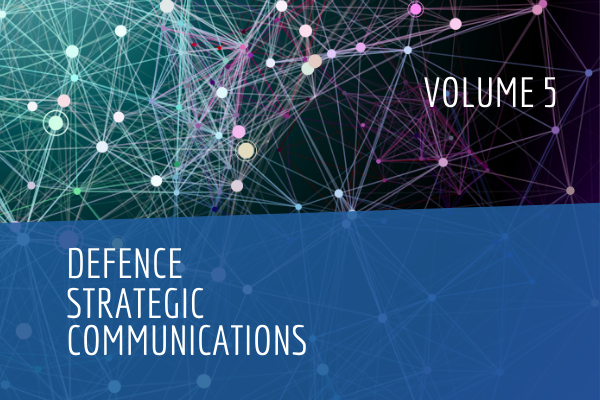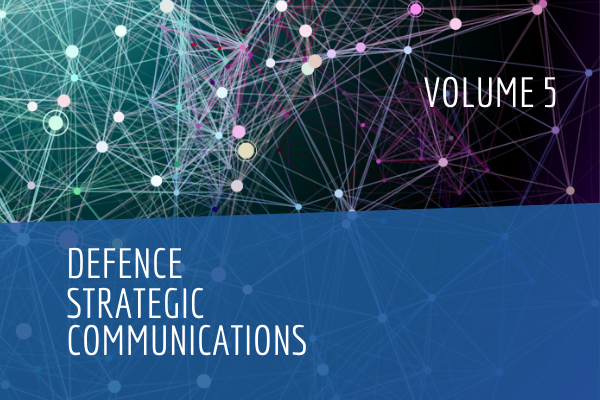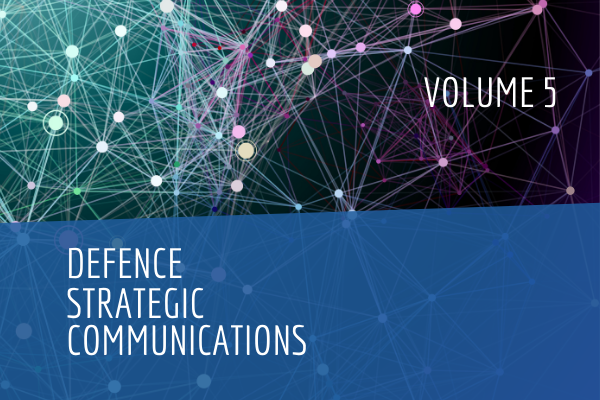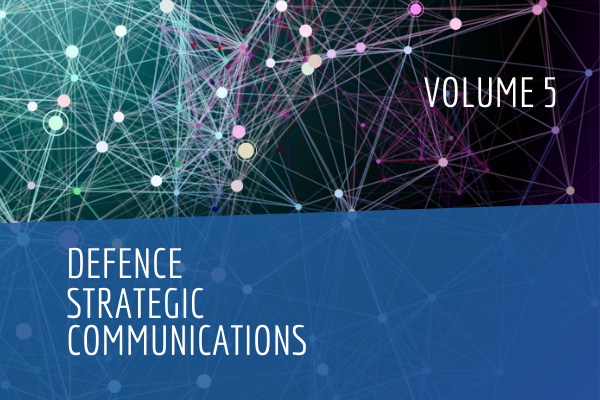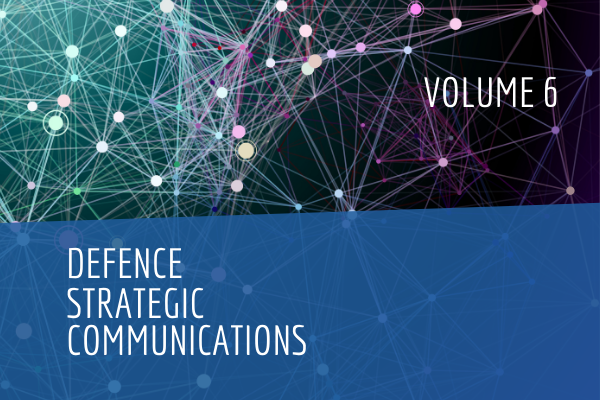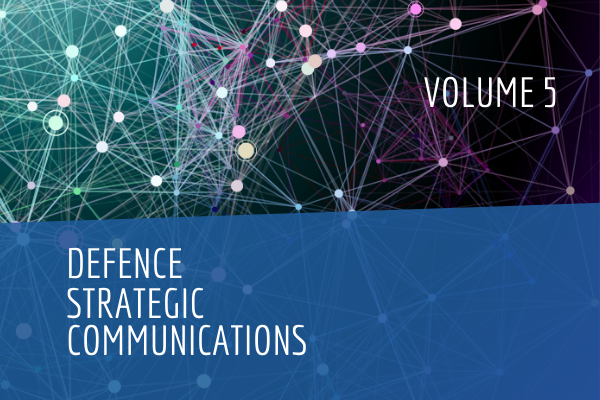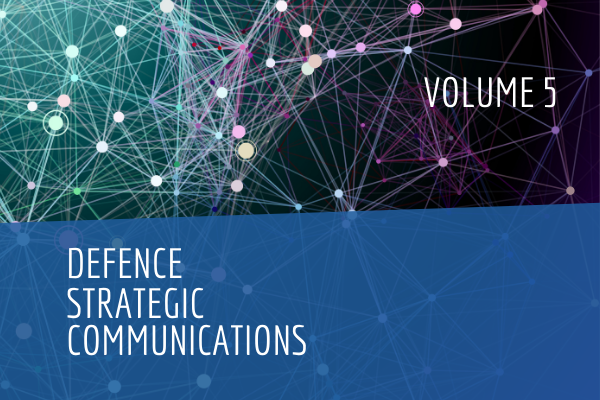Abstract
Despite following best practice, most governments fail in their strategic communications. There is a missing ‘X’ factor: trust. This offers a quick win to strategic communicators, provided they understand what the phenomenon involves. Moreover, it allows practitioners to avoid the risk of citizens feeling betrayed when their government fails to deliver.
Keywords: trust, communications, impersonal trust, distrust, reliance, co-operation, strategic communications
About the author
Dr Francesca Granelli is a Teaching Fellow at King’s College London, where her research focuses on trust. Her forthcoming book is Trust, Politics and Revolution: A European History.
Bibliography
Anderson, James C. and James A. Narus, (1990) ‘A model of distributor firm and manufacturing firm working relationships’, Journal of Marketing, Vol. 54, № 1, pp. 42–58.
Althuis, Jente and Leonie Haiden, (eds), Fake News: A Roadmap (Riga: The NATO StratCom Centre of Excellence, 2018).
Almond, Gabriel, A. and Verba, Sidney, The Civic Culture Revisited. Revised ed. (Sage Publications, 1989).
Asen, Robert, ‘Toward a Normative Conception of Difference in Public Deliberation’, Argumentation and Advocacy, Vol. 25, (Winter 1999): 115–29.
Axelrod, Robert, The Evolution of Cooperation (New York: Basic Books, 1984).
Bachmann, Reinhard and Andrew C. Inkpen, ‘Understanding Institutional-based Trust Building Processes in Inter-organizational Relationships’, Organization Studies, Vol. 32, № 2 (2011): 281–301.
Baier, Annette C., Moral Prejudices: Essays on Ethics (Harvard University Press, 1995).
Becker, Lawrence C. ‘Trust as noncognitive security about motives’, Ethics, Vol. 107, № 1 (1996): 43–61.
Belloc, Hilaire, The Servile State (originally published in 1912, reissued by Cosimo Classics, 2007), pp. 95–113.
Berk, Laura E. ‘Emotional Development’, in L. E. Berk (ed.), Child Development (Pearson, 2012), pp. 398–443.
Blumer, Herbert, ‘Collective Behavior’, in A.M. Lee (ed.), Principles of Sociology, 3rd Edition (New York: Barnes & Noble Books, 1969), pp. 219– 88.
Booth, Ken and Nicholas Wheeler, The Security Dilemma: Fear, Cooperation and Trust in World Politics (Palgrave Macmillan, 2007).
Botsman, Rachel, Who can you Trust? How Technology Brought Us Together— and Why It Could Drive Us Apart (London: Portfolio Penguin, 2017).
Buss, David M., ‘Cognitive Biases and Emotional Wisdom in the Evolution of the Conflict between the Sexes’, American Psychologist Society, Vol. 10, № 6 (2001): 219–23.
Campbell-Smith, Duncan, Masters of the Post: The Authorized History of the Royal Mail (London: Penguin, 2012).
Christie, Richard and Florence. L. Geis, Studies in Machiavellianism (Social Psychology Monographs), (Academic Press Inc, 1970).
Citrin, Jack, ‘Comment: The Political Relevance of Trust in Government’, The American Political Science Review, Vol. 68, № 3 (1974): 973–88.
Coleman, James S., Foundations of Social Theory (Cambridge, MA: Belknap Press of Harvard University Press, 1990).
Collins, Randall, Conflict Sociology: Toward an Explanatory Science (Academic Press Inc, 1975)
Cook, Karen S., Russell Hardin and Margaret Levi, Cooperation without Trust? (NY, NY: Russell Sage Foundation Publications, 2005).
Converse, Philip, E., ‘The nature of belief systems in mass publics’, Critical Review, Vol. 18, No. 1–3, (2006) 1–74.
Craig, S. C., Broken Contract? Changing Relationships Between Americans And Their Government (Transforming American Politics), (Westview Press, 1996).
Davies, Caroline, ‘Grenfell Tower: May apologises for “failures of state, local and national” ’, Guardian, 21 June 2017.
Dasgupta, Partha, ‘Trust as a Commodity’, in D. Gambetta, (ed.), Trust: Making and Breaking Cooperative Relations (Oxford, UK: Oxford University Press, 1988): 49–72.
Dreyfus, Hubert L., Being in the World: Commentary on Heidegger’s ‘Being and Time’, Division 1 (MIT Press, 1991).
Edelman Trust Barometer Global Report (London, 2018).
Engels, Friedrich and Karl Marx, Manifesto of the Communist Party (Progress Publishers, 1969).
Einstein, Albert, ‘Albert Einstein warns of dangers in nuclear arms race’, NBC News Broadcast, 12 February 1950.
Farwell, James P., Persuasion and Power: The Art of Strategic Communications (Washington DC: Georgetown University Press, 2012).
Fraser, Nancy, ‘Rethinking the Public Sphere: A Contribution to the Critique of Actually Existing Democracy’, Social Text, Vol. 25, № 2 (1990): 56–80.
Freedman, Lawrence, Nuclear Disarmament: The Need for a New Theory (Lowy Institute for International Policy, 2009).
Gambetta, Diego (ed.), Trust: Making and Breaking Cooperative Relations (Oxford: University of Oxford, 1988).
Gambetta, Diego, The Sicilian Mafia: The Business of Private Protection (Harvard University Press, 1996).
Giddens, Anthony, The Constitution of Society, Vol. 20 (Oxford: Polity Press, 1984).
Goodwin, Brian, How the Leopard Changed its Spots: The Evolution of Complexity (Princeton: Princeton University Press, 2001).
Griffin, Roger, Fascism (Oxford Readers), (Oxford Paperbacks, 1995).
Griffiths, James and Yoonjung Seo, ‘North Korea’s Kim has “unwavering trust” in Trump, South Korea says’, CNN (International Edition), 6 September 2018.
Gunnthorsdottir, Anna, Kevin McCabe, and Vernon Smith, ‘Using the Machiavellianism Instrument to Predict Trustworthiness in a Bargaining Game’, Journal of Economic Psychology, Vol. 23, № 1 (2002): 49–66.
Haidt, Jonathan, ‘The Emotional Dog and Its Rational Tail: A Social Intuitionist Approach to Moral Judgment’, Psychological Review, Vol. 108, № 4 (2001): 814–834.
Hardin, Russell, Trust and Trustworthiness (Russell Sage Foundation Publications, 1996).
Harris, J. ‘Society and the state in twentieth-century Britain’, in F.M.L. Thompson, ed., The Cambridge Social History of Britain, 1750–1950 Volume 3: Social Agencies and Institutions (Cambridge, UK: Cambridge University Press, 1990), pp. 63–118.
Hauser, Gerard, ‘Vernacular Dialogue and the Rhetoricality of Public Opinion’, Communication Monographs, Vol. 65, № 3 (1998): pp. 83–107.
Hetherington, M. J., Why Trust Matters: Declining Political Trust and the Demise of American Liberalism (Princeton, NJ: Princeton University Press, 2006).
Hollis, Martin, Trust Within Reason (Cambridge: Cambridge University Press, 1998).
Holton, Richard, ‘Deciding to Trust, Coming to Believe’, Australasian Journal of Philosophy, Vol. 72, № 1 (1994) 63–76.
Hunter, Chris and Kent McClelland, ‘Theoretical Perspectives in Sociology’, in S. J. Ferguson, (ed.), Mapping the Social Landscape: Readings in Sociology, 7th Edition (McGraw-Hill, 2012).
Huntington, Samuel, P., Political Order in Changing Societies (Yale University Press, 1973).
Inglehart, Ronald, Modernization and Postmodernization: Cultural, Economic, and Political Change in 43 Societies (Princeton University Press, 1997).
Jones, Karen, ‘Trust as an Affective Attitude’, Ethics, Vol. 107, № 1 (1996): 4–25.
Jucks, Regina, Gesa A. Linnemann, Franziska M. Thon, and Maria Zimmermann, ‘Trust the Words: Insights into the Role of Language in Trust Building in a Digital World’, in Bernd Blobaum (ed.), Trust and Communications in a Digitized World (London: Springer, 2016), pp. 225–37.
Khodyakov, Dmitri M., ‘Trust as a Process: A Three-Dimensional Approach’, Sociology, Vol. 41, № 1 (2007): 115–32.
Kierkegaard, Søren, Concluding Unscientific Postscript: Philosophical Fragments (Princeton: Princeton University Press, 1992).
Kohn, Marek, Trust Self-Interest and the Common Good (Oxford: Oxford University Press, 2009).
Kramer R. M. and Wei, J., ‘Social uncertainty and the problem of trust in social groups: The Social Self in Doubt.’, in T.R. Tyler et al. (eds), The psychology of the social self (Mahwah, NJ: Lawrence Erlboum Associates, 1999): 145–68.
Krueger, Joachim I. (ed), Social Judgment and Decision Making (NY, NY: Psychology Press, 2012).
Kydd, Andrew H., Trust and Mistrust in International Relations (Princeton: Princeton University Press, 2005).
Lagerspetz, Olli, Trust: The Tacit Demand (Dordrecht: Kluwer Academic Publishers, 1998).
Lahno, Bernd, ‘On the Emotional Character of Trust’, Ethical Theory and Moral Practice, Vol. 4, № 2 (2001): 171–89.
Lahno, Bernd, ‘Three Aspects of Interpersonal Trust’, Analyse & Kritik, Vol. 26, № 2 (2004): 30–47.
Levi, Margaret, ‘A State of Trust’, in Valarie Braithwaite & Margaret Levi, (eds), Trust and Governance (New York: Russell Sage Foundation, 1998).
Lewicki, Roy, Daniel J. McAllister and Robert J. Bies, ‘Trust and Distrust: New Relationships and Realities’, The Academy of Management Review, Vol. 23, № 3 (1998): 438–58.
Lewicki, Roy and Bunker, B. ‘Developing and Maintaining Trust in Working Relationships’, in R.M Kramer & T.R Tyler (eds), Trust in Organizations: Frontiers of theory and research (Thousand Oaks, CA: Sage, 1996): 114–39.
Lewis, J. David and Andrew J. Weigert, ‘Trust as a Social Reality’, Social Forces, Vol. 63, № 4 (1985): 967–85.
Lippmann, Walter, ‘Today and Tomorrow’, New York Herald Tribune, 10 December 1963.
Lipset, Seymour, M. and Schneider, William, ‘The Confidence Gap during the Reagan Years 1981–1987’, Political Science Quarterly, Vol. 102, № 1, (1987) pp. 1–23.
Luhmann, Niklas, Trust and power. (Chichester, UK: John Wiley & Sons, 1979).
Luhmann, Niklas, ‘Familiarity, Confidence, Trust: Problems and Alternatives’, in Diego Gambetta (ed), Trust: Making and Breaking Cooperative Relations (Oxford: University of Oxford, 1988): 94–107.
Luhmann, Niklas, The Differentiation of Society (New York: Columbia University Press, 1982) p. 232.
Luhmann, Niklas, Social Systems (Stanford: Stanford University Press, 1995) p. 158.
Lundåsen, S. Wallman, ‘Methodological problems with surveying trust’, in JSM Proceedings at AAPOR (Alexandria, VA: American Statistical Association, 2010): 5806–15.
MacLeod, Iain, ‘Quoodles’, The Spectator, 3 December 1965.
Margetts, Helen Z., Peter John, Scott Hale, and Taha Yasseri, Political Turbulence (Princeton, NJ: Princeton University, 2016).
Rodrigo Mallea, Matias Spektor and Nicholas J. Wheele, ‘The Origins of Nuclear Cooperation: A Critical Oral History between Argentina and Brazil, A joint conference between FGV, ICCS and the Woodrow Wilson International Center for Scholars Rio de Janeiro, 21–23 March 2012.
McClosky, Herbert ‘Consensus and Ideology in American Politics’, The American Political Science Review, Vol. 58, № 2, (1964): 361–82.
McKnight, D. Harrison and Norman L. Chervany, ‘The Meanings of Trust’, Working Paper series, WP 96-04 (University of Minnesota MIS Research Center, 1996).
Mead, George, Herbert, Mind, Self and Society (The University of Chicago Press, 1969).
Mercer, Jonathan, ‘Rationality and Psychology in International Politics’, International Organization, Vol. 59, № 1 (2005): 95.
Merrick, Rob, ‘Theresa May urges the public to “trust me” to deliver Brexit amid increasingly bitter cabinet rows’, The Independent, 12 May 2018.
Merton, Robert, K. On Social Structure and Science (Heritage of Sociology Series). (University of Chicago Press, 1996).
Michel, Torsten, ‘Time to Get Emotional: Trust, Rationality and the Spectre of Manipulative Mentality’,Working Paper № 01-11, School of Sociology, Politics and International Studies, University of Bristol, 2011.
Mills, C. Wright, The Power Elite (Galaxy Books), (Oxford University Press Inc., 1956).
Mishler, William and Richard Rose, ‘What are the Origins of Political Trust? Testing Institutional and Cultural Theories in Post-Communist Societies’, Comparative Political Studies, Vol. 34, № 1 (February, 2001): 30– 62.
Middlemas, Keith, Politics in an Industrial Society: The Experience of the British System Since 1911. (HarperCollins, 1979).
Mulgan, Geoff, The Art of Public Strategy: Mobilizing Power and Knowledge for the Common Good (Oxford University Press, 2008).
Mullins, W. A., ‘Sartori’s concept of ideology: a dissent and an alternative in’, in A.R. Wilcox (ed.), Public Opinion and Political Attitudes: A Reader (New York: John Wiley & Sons, 1974).
Murphy, John, ‘What is Money, Why Do We Trust It, and Has It Become Too Confusing?’, BBC Radio 4 current affairs programme, 26 March 2012.
Nahrkhalaji, Saeedeh Shaifiee, ‘Language , Ideology and Power: a Critical Approach to Political Discourse’, Paper given at the 1st National Conference of Language, Discourse and Pragmatics, Chamran University, Ahvaz, Iran in 2010.
Naef, Michael and Jürgen Schupp, ‘Measuring Trust: Experiments and Surveys in Contrast and Combination’, Discussion Paper № 4087 (IZA Institute of Labor Economics, 2009).
O’Neill, Onora, A Question of Trust: The BBC Reith Lectures 2002 (Cambridge University Press, 2002).
Osgood, Charles. E., An Alternative To War Or Surrender (Chicago, Illinois: University of Illinois Press, 1962)
Parfitt, Tom, ‘Russia is Winning the Information War on Home Turf ’, The Times, 6 April 2018.
Parry, Geraint, ‘Trust, Distrust and Consensus’, British Journal of Political Science, Vol. 6, № 2 (1976): 129–42.
Parsons, Talcott, The Structure of Social Action: 001, 2nd Edition. (Free Press, 1967).
Pauley, Bruce, F., Hitler, Stalin and Mussolini: Totalitarianism in the Twentieth Century (European History), (Harlan Davidson Inc, 1997).
PBC Today, Grenfell Tower tragedy dents confidence in councils, poll suggests, 27 November 2018.
Pixley, J ‘Impersonal Trust in Global Mediating Organizations’, Sociological Perspectives, Vol. 42, № 4 (Winter, 1999), pp. 647–71.
Putnam, Robert D., Bowling Alone: The Collapse and Revival of American Community (Simon & Schuster, 2000).
Robinson, Heather, M. Connable, Ben, Thaler, David E., Scotten, Ali G., Sectarianism in the Middle East Implications for the United States (RAND Corporation, 2018).
Rotfeld, Adam Daniel, ‘Confidence- and Security-building Measures (CSBMs) in the Modern Context: the European Experience’, Korean Journal of Defense Analysis, Vol. 20, № 1 (2008): 3–12.
Rotter, Julian B., ‘Interpersonal Trust, Trustworthiness, & Gullibility’, American Psychologist, Vol. 35, № 1 (1980): 1–7.
Russell, Jeffrey B., ‘The Myth of the Flat Earth’, in American Scientific Affiliation Conference (Westmont College, 1997).
Sandel, Michael, J. Liberalism and the Limits of Justice (Cambridge University Press, 1998).
Scherer, Klaus R., ‘On the Rationality of Emotions: Or, When are Emotions Rational?’, Social Science Information, Vol. 50, № 3–4 (2011): 330–50.
Schramm, Wilbur, ‘How communication works’, in W. Schramm (ed.), The Process and Effects of Mass Communication (Urbana, Illinois: University of Illinois Press, 1954).
Secor, Anna J. John O’Loughlin, ‘Social and Political Trust in Istanbul and Moscow: A Comparative Analysis of Individual and Neighbourhood Effects’, Transactions, Institute of British Geographers, Vol. 30, № 1 (2005): 66–82.
Shannon, Claude E. and Warren Weaver, The Mathematical Theory of Communication (Urbana, IL: University of Illinois Press, 1963).
Solomon, Robert C., and Fernando Flores, Building Trust: In Business, Politics, Relationships, and Life (Oxford University Press, 2003).
Sztompka, Piotr, Trust, Distrust and the Paradox of Democracy, WZB Discussion Paper, No. P 97-003 (Berlin: WZB Berlin Social Science Centre, 1997).
Tanzi, Vito and Ludger Schuknecht, Public Spending in the 20th Century: A Global Perspective (New York: Cambridge University Press, 2000).
Tartir, Alaa ‘Palestinians Have Been Abandoned by Their Leaders’, Foreign Policy, 24 MAY 2018.
Taylor, Charles, Sources of the Self (Harvard University Press, 1992).
Tversky, Amos and Daniel Kahneman, Judgment under Uncertainty: Heuristics and Biases (Cambridge University Press, 1982).
Turner, John C., Rediscovering the Social Group: A Self-Categorization Theory (Oxford: Blackwell, 1987).
Van de Walle, Steven and Frédérique Six, ‘Trust and distrust as distinct concepts: Why studying distrust in institutions is important’, Journal of Comparative Policy Analysis, Vol. 16, Iss. 2 (2014): 158–74.
Wardle , Claire and Hossein Derakhshan, Information Disorder: Toward an interdisciplinary framework for research and policymaking, Council of Europe report, 27 September 2017.
Weintraub, Jeff and Krishan Kumar, Public and Private in Thought and Practice: Perspectives on a Grand Dichotomy (Chicago: University of Chicago Press, 1997).
Wheeler, Nicholas J., ‘Trust building between enemies in the nuclear age’, Paper delivered to the All-Wales Peace Conference, 22 September 2007, p. 6.
Wheeler, Nicholas J., ‘‘I Had Gone to Lahore With a Message of Goodwill but in Return We Got Kargil’: The Promise and Perils of ‘Leaps of Trust’ in India-Pakistan Relations’, India Review, Vol. 9, № 3 (2010): 319–44.
Wicker, Elmus, The Banking Panics of the Great Depression (Cambridge University Press, 1996).
Williams, Bernard, ‘Formal Structures and Social Reality’, in Diego Gambetta, (ed.), Trust: Making and Breaking Cooperative Relations (Wiley- Blackwell, 1988), pp. 3–13.
Williams, John, ‘When People Don’t Know What They Don’t Know: Brexit and the British Communication Breakdown’, Defence Strategic Communications Vol. 4 (NATO Strategic Communications Centre of Excellence, 2018): 207–24, p. 208.
Wright, Stephen, ‘Trust and Trustworthiness’, Philosophia, Vol. 38, (2010): 615–27.
Zeffane, R. et al., ‘Commitment, Communication & Trust—Exploring the Triad’, International Journal of Business and Management, Vol.6, № 6 (2011): 77–87.
Zsolnai, Laszlo, ‘The Rationality of Trust’, International Journal of Social Economics, Vol. 32, № 3 (2005): 268–69.
